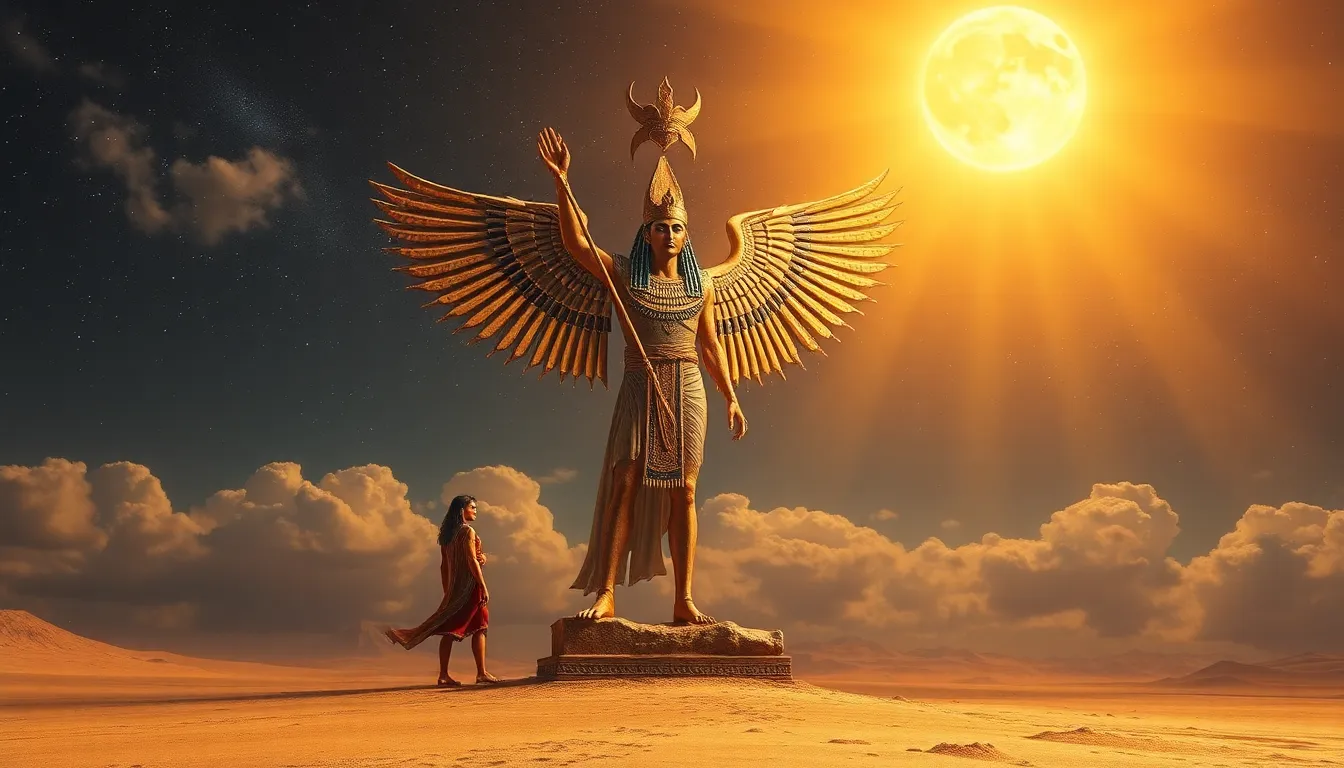The Role of Divine Kingship in Egyptian Astronomy
I. Introduction
Divine kingship in ancient Egypt refers to the belief that pharaohs were not merely human rulers but divine entities with a direct connection to the gods. This concept positioned the pharaoh as a mediator between the heavens and the earth, responsible for maintaining cosmic order and harmony.
Astronomy held significant importance in Egyptian culture, influencing various aspects of life, including agriculture, religion, and governance. The Egyptians observed celestial phenomena meticulously, leading to a sophisticated understanding of the cosmos that was deeply intertwined with their spiritual beliefs.
This article aims to explore the interplay between divine kingship and astronomy in ancient Egypt, examining how these two elements influenced each other and shaped the civilization’s worldview.
II. Historical Context of Divine Kingship in Egypt
The concept of divine kingship has its origins in the early dynastic period, where rulers were regarded as gods on earth. Over time, this concept evolved, with pharaohs increasingly seen as embodiments of the divine, particularly associated with gods like Horus and Osiris.
Pharaohs were viewed as divine intermediaries who could communicate with the gods and were responsible for ensuring the prosperity of the land. This role included performing rituals and maintaining Maat, the ancient Egyptian concept of truth, balance, and cosmic order.
Notable pharaohs such as Ramses II and Akhenaten exemplified this divine status, using their reigns to promote religious practices that emphasized their connection to the divine. For instance, Akhenaten’s establishment of monotheism centered around the sun disk, Aten, reinforced the idea of the pharaoh as a god.
III. The Importance of Astronomy in Ancient Egypt
Egyptians practiced astronomy extensively, utilizing their knowledge to develop calendars, predict seasons, and guide agricultural practices. The annual flooding of the Nile, vital for agriculture, was closely observed and correlated with celestial events.
The relationship between astronomy and agriculture was crucial; for example:
- The heliacal rising of Sirius (Sopdet) indicated the onset of the Nile’s flooding.
- Seasonal calendars were based on lunar cycles and solar movements.
Celestial bodies also played a vital role in religious and cultural life. The sun, moon, and stars were often associated with various deities, forming a complex mythology that underpinned daily existence.
IV. The Pharaoh as a Celestial Figure
The symbolism of the pharaoh’s connection to the heavens was prevalent in Egyptian art and literature. Pharaohs were often depicted with celestial elements, such as the sun disk or stars, illustrating their divine nature and celestial authority.
In art, pharaohs were frequently shown in association with the sky goddess Nut or the falcon god Horus, emphasizing their elevated status. Literature, such as the Pyramid Texts, often included references to the pharaoh’s journey to the afterlife among the stars, reinforcing the connection between the divine ruler and the celestial realm.
Additionally, maintaining Maat was a fundamental responsibility of the pharaoh, ensuring that cosmic order was preserved. This concept extended beyond mere governance; it involved the pharaoh’s relationship with the gods and the cosmos.
V. Astronomical Alignments in Monumental Architecture
The monumental architecture of ancient Egypt, such as pyramids and temples, was often aligned with celestial bodies, reflecting the importance of astronomy in religious practices. These alignments served both practical and spiritual purposes.
For example:
- The Great Pyramid of Giza is aligned with the cardinal points and certain stars, demonstrating advanced astronomical knowledge.
- The Temple of Karnak features numerous astronomical alignments, particularly with solar events, which played a key role in religious rituals.
The significance of these alignments was profound, as they connected the earthly realm with the divine, reinforcing the pharaoh’s role as a cosmic mediator.
VI. The Influence of Divine Kingship on Astronomical Knowledge
Pharaohs were not only rulers but also patrons of knowledge, including astronomy. Their divine status allowed them to support astronomical research and observations, fostering advancements in this field.
Astronomy was integrated into state administration, with calendars developed to regulate agricultural activities and religious festivals. This integration was crucial for maintaining Maat and ensuring societal stability.
Priests and scholars played a vital role in advancing astronomical knowledge, often working under the auspices of the pharaoh. They observed celestial phenomena, recorded events, and interpreted the significance of these observations in relation to divine kingship.
VII. The Legacy of Divine Kingship in Egyptian Astronomy
The legacy of divine kingship in Egyptian astronomy has had a lasting impact on subsequent cultures and civilizations. The astronomical knowledge developed by the Egyptians influenced later societies, including the Greeks and Romans, who adopted and adapted these concepts.
As divine kingship declined, so too did the centralized astronomical practices of ancient Egypt. However, the foundational work laid by the Egyptians continued to resonate in the realms of astronomy and astrology.
Modern interpretations and studies of ancient Egyptian astronomy reveal the sophistication of their astronomical practices, highlighting the enduring significance of their achievements.
VIII. Conclusion
In summary, divine kingship and astronomy were intricately linked in ancient Egypt, with each influencing the other in profound ways. The pharaoh’s role as a divine mediator shaped astronomical practices and beliefs, while the celestial realm reinforced the pharaoh’s divine status.
The lasting significance of this interplay is evident in the legacy of ancient Egyptian astronomy, which continues to inspire and inform modern scholarship. Further research into this fascinating relationship promises to unveil even more about the complexities of ancient Egyptian culture.
As we delve deeper into the realms of divine kingship and astronomy, we uncover the rich tapestry of beliefs and practices that defined one of history’s greatest civilizations.




